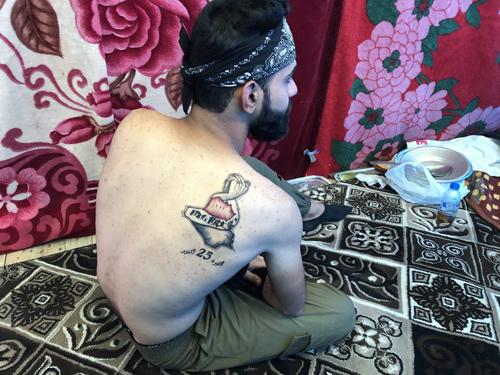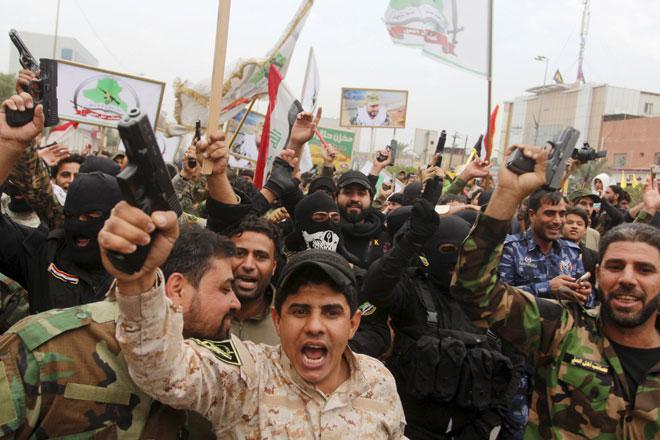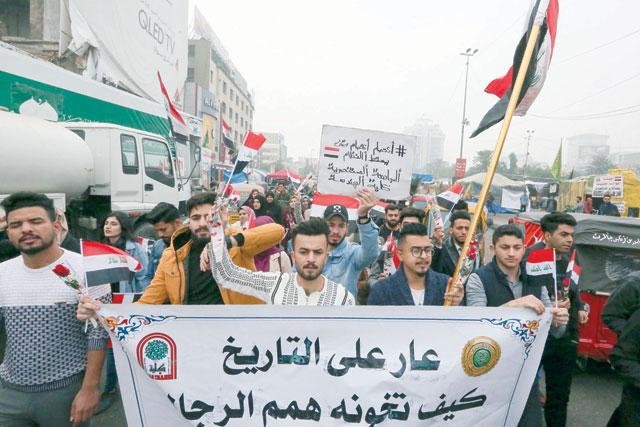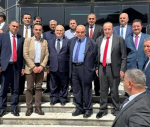You are here
Inked at the uprising: Iraq's teenage tattoo artist
By AFP - Dec 15,2019 - Last updated at Dec 15,2019

An Iraqi man displays his tattoo in the capital Baghdad on December 9 (AFP photo)
BAGHDAD — At 16, Maram is as old as the political system she and fellow Iraqi youth are railing against. But the spunky teen has her own way of protesting: Inking tattoos.
In the blue-tinged light inside a tarp tent, the petite teenager carefully moves her mechanised tattoo pen across the left shoulder of her skinny teenage friend.
It is a sketch of Baghdad's Freedom Monument — a huge stone and bronze slab charting Iraq's path to a republic on Tahrir Square, the beating heart of Iraq's anti-government protests.
Its centrepiece is a dark figure with arms outstretched, wrenching apart a barrier.
"I like to break down barriers," Maram Uday says, after filling in the miniature black version on her friend's bare shoulder.
"It's not easy for people to accept this. Girls who tattoo typically work only in salons and on other girls," says Maram, who wears thick black eyeliner and a short, dramatic bob.
"But I decided to leave behind the traditional because change is necessary."
The fine arts student and amateur model began tattooing eight months ago as a way to make some extra money.
She joined the protests against government corruption and a lack of jobs in October and was so moved she drew a permanent memento on her left wrist.
It reads "OCT 25", the date a second, continuous wave of demonstrations erupted in Baghdad and Iraq's Shiite-majority south.
'Plenty of memories'
Inspired, friends started lining up to get their own commemorative body art, which Maram draws for free.
"There are people who decided to donate medicine or clothes, I decided to donate this," she tells AFP.
She has drawn at least 15 protest-related tattoos, including "October 25", the Freedom Monument and a gas mask of the type protesters use to protect themselves from volleys of tear gas canisters fired by security forces.
Youth make up around 60 per cent of Iraq's 40 million people — and about 100 per cent of Maram's clients.
She comes to Tahrir every morning with her portable tattoo kit, usually with a list of appointments booked through her Instagram page, which has over 80,000 followers.
Hashem, 18, lifts his pale yellow shirt to show AFP the small gas mask tattoo he got on his right hip just a week ago — his first tattoo.
"We have plenty of memories... so I wanted to get a tattoo of it," he says.
He has been in Tahrir for weeks and professes revolutionary rhetoric — but is still, at the end of the day, a teen.
"I couldn't get one on my hand because my parents wouldn't accept it," he says sheepishly.
'A tattoo to remember'
The youth-dominated movement is unprecedented both for its spontaneity and resilience — but also for the violence with which it has been met.
Around 460 people have died and 20,000 have been wounded, and all around Tahrir, small memorials have sprung up to commemorate them — murals bearing victims' names or small stands with personalised candles.
Maram's newest client, a 19-year-old who identified himself as "Crush", wanted a more permanent reminder of those who have given their lives.
"I got it as a memento for my friends who died and were kidnapped," says Crush, gesturing to the fresh Freedom Monument on his shoulder.
At 23, Mushtaq Taleb from the southern port city of Basra already sports more than a half-dozen tattoos on his arms.
His latest, on his right shoulder, is a compound image: The date of the uprising, a map of Iraq, and the Freedom Monument melting into two hands joined together in a stylised shape of a fist.
"This tattoo represents the fact that the October 25 revolution erased something huge that the 16 past years couldn't erase: sectarianism," says Taleb.
Among the Shiite-majority protesters on Tahrir are Sunni residents of other provinces and minority Christians, too — a large tent just a few doors down is adorned with pictures of Jesus.
"I had to get this tattoo to remember," he tells AFP.
"Tomorrow, the next day, the next year, when we grow up, people will ask us, what's that tattoo? What happened? We have to explain what took place in this revolution."
Related Articles
BAGHDAD — Several thousand protesters, most of them members of Shiite paramilitary forces, gathered in central Baghdad on Saturday to demand
BAGHDAD — Iraq's anti-regime protesters gathered in the capital and south on Saturday, grieving but defiant after 17 were killed in an attac
BAGHDAD — A supporter of Iraqi anti-government demonstrators was gunned down in Baghdad, a police source said Sunday, the fourth backer of t

















